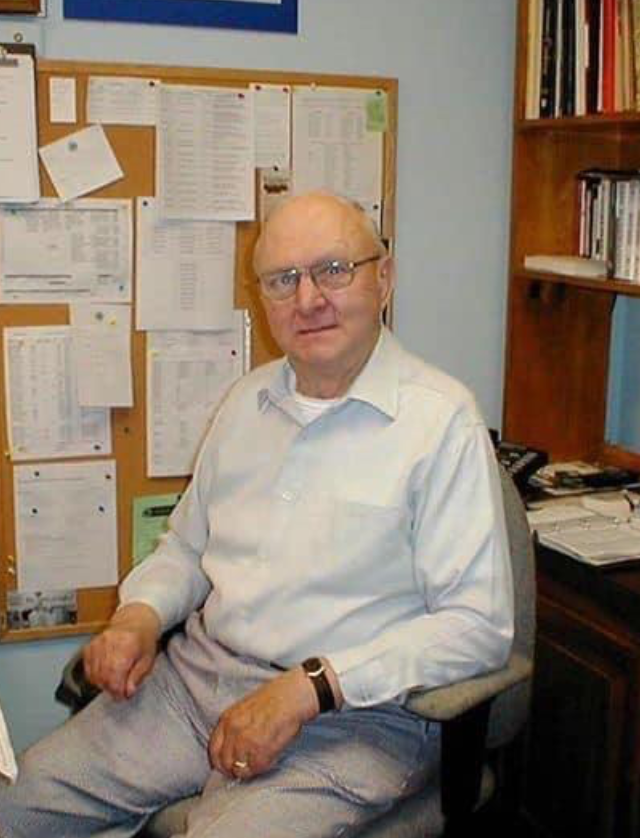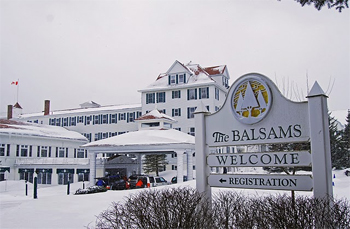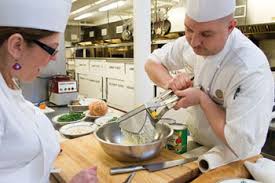
Our industry recently lost a giant of the professional kitchen. Chef Phil Learned stood tall in the kitchen of The Balsams Grand Resort in Dixville Notch, NH. In its day, the Balsams was one of the finest destination resorts in the country – a place of elegant relaxation, beautiful surroundings, and most notably – exceptional food. This place tucked away in the hills of the northeast represented the epitome of culinary arts in their American Plan dining room. A stay at the Balsams included all meals – each one representative of the dining style that had a long history of classic representation.

The kitchen of the Balsams was expansive and structured in the manner of Escoffier. A separate pastry shop with Patissier and Boulanger, a Garde Manger department where elaborate platters of charcuterie, cheeses, fruit and crudité were built to complete elaborate buffet presentations; a butcher shop that broke down primal and sub primal cuts of meat and filleted the fresh fish that came from Portland, Gloucester and Boston; simmering stocks and reducing sauces from the prep kitchen; and of course a hot line that was built for speed and volume with quality always front and center.

The menu changed every night within a cycle with a full array of appetizer, salad, entrée and dessert choices for an audience that was likely staying at the hotel for a week or more at a time (many of the patrons were second or third generation Balsam’s guests) since a stay at the “Notch” was a family right of passage. Each line cook during service had one dish to prepare completely. Guests would make their selection, servers would drop off a plate cover to a cook’s station, and then the final preparation and plating would begin. Counts were tallied throughout the night and the chef/expeditor would keep everyone apprised as to how many guests had been served and how many registered guests remained. Service was swift and efficient as the 300-400 patrons were acknowledged at each meal.
What was most impressive to me was the work leading up to service. From purchasing to plating there was a commitment to communication and doing your job well. Professionalism was expected from the starched chef uniforms that were maintained by the on-site laundry, the cleaning regiment that everyone participated in, the adherence to classical techniques, and the respect that was shown everyone who became part of the team.
Prior to the beginning of service each cook had to prepare two sample plating’s of his or her respective dish. One was set for the department chefs to evaluate before service, making any last minute adjustments to the flavor profile and presentation; and the other would grace the show table in the dining room. This way, every guest who entered the dining room was able to see every menu item as they made their menu decision.
Those last few moments before the dining room doors were opened saw every member of the service staff around the show table as chefs went over the preparation, ingredients, and flavors of each dish. It was important for service staff to know the menu and be that seasoned resource for guest questions. This ritual was so important to the Balsam’s Experience.
At the core of the kitchen team were highly professional, accomplished chefs and a cadre of enthusiastic apprentices. The Balsams was one of the premier formal cook’s apprenticeship sites in the country. Supported by the American Culinary Federation, this highly structured 6,000-hour program was the passion of Phil Learned. He was always an ambassador for passing it forward – for making sure that what he had learned throughout his career, was given with enthusiasm to any who were committed and enthusiastic recipients.
Over the years a significant number of young cooks got their start in the Balsam’s kitchen as an ACF Apprentice. A number of those individuals went on to hold the top position in restaurant, hotel, resort, and club kitchens as well as those who went on to become entrepreneurs. It was easy to recognize a Balsam’s cook in their spotless, starched chef coats and professional decorum. “Yes Chef” was the typical response to any directive that was made in Chef Learned’s kitchen. After two tours in the military (WWII with the Marines and Korea as a member of the Army) Chef Phil worked his way up to his first chef position at the Balsam’s in 1966. He served as Executive Chef (the first chef to be certified at that level in the State of New Hampshire) until 1977 when he became the Director of Food Services where he stayed until 2005.

Since many of the employees at the resort were apprentices or interns from other schools – a significant portion of staff members lived on property during their season. This led to a sense of team and loads of positive camaraderie. Chef Learned, cognizant of the importance of professionalism and team dynamics always made sure that staff meals were of the highest quality and a priority of the kitchen. He also instilled a commitment to the basics of cooking. Stocks were made as they were intended, knife skills were to be exact, sauces were defined by their history, caramelization in cooking was paramount, the right pan for the right task, and mise en place ruled the day.
Chef Phil will be missed, but his legacy will live on – a legacy of giving back, of teaching the next generation, of insisting on standards of excellence, setting the stage in kitchens for professional conduct, and customer service above all else. I feel fortunate to have known Chef Learned and to call him a friend. Working with many of his exceptional leadership team: Charles Carroll, Steve James, Will Beriau, Torill Carroll, Steve Learned, Jennifer Beach, and John Carroll – I built a new level of commitment to my own work as did every young cook who passed through those kitchen doors.
Rest in Peace Chef!
PLAN BETTER – TRAIN HARDER
Harvest America Ventures, LLC
www.harvestamericacues.com BLOG
CAFÉ Talks Podcast

Leave a comment